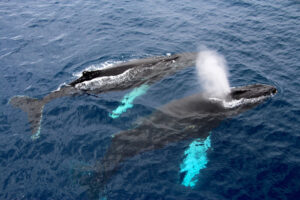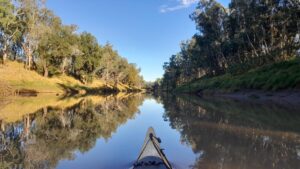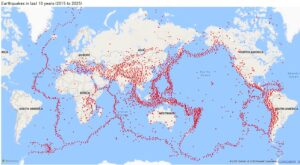Since our last update, several expeditions have begun in the Atlantic, a Pacific rower struggles, and the Talisker Whisky Atlantic Challenge has a winner.
Talisker Whisky Atlantic Challenge
In the TWAC, soloists, pairs, trios, and quads race to complete the 5,000km crossing from Tenerife to Antigua. The Four Oarsmen (UK) hold the record for the course. In 2018, they finished in 29 days, 14 hours, and 34 minutes.
This year’s winners, Swiss Raw, are the four-man team of Roman Mockli, Jan Hurni, Samuel Widmer, and Ingvar Groza. They are the first group from an inland country to win. They crossed in 34 days, 23 hours, and 42 minutes.
The four close friends met during their military service. The race started well for them and they moved into the lead on December 21. The four chose to row a more southerly line to avoid the storms predicted on the northern route. Choosing a route is always a gamble. The northern line is more direct but has headwinds. The southern line is longer but has calmer waters.
The battle for second place is currently underway between Five in a Row and Atlantic Flyers. Five in a Row are 159km from the finish line and the fours Atlantic Flyers are just three kilometres behind them, at 162km from the finish line. Current tracking predicts that both crews will finish today, January 17, between 18:00 and 19:00 UTC.
Thirty-seven days into the row, the leaderboard is as follows:
Winners: Swiss Raw
Leading five: Five in a Row (5,000km)
Leading four: Swiss Raw (Finished)
Leading trio: East Rows West (4800km)
Leading pair: Two Rowing Finns (4292km)
Leading soloist: Ocean Rower (3283km)
Mission Atlantic
The TWAC is not the only Atlantic event at the moment. The much smaller Mission Atlantic is also underway. Supposedly it isn’t a race, and the event merely “supplies support to crews who want to row the Atlantic independently”. Only serving members of the military or veterans can take part in the 4,815km row from Gran Canaria to Barbados. Two crews set off on December 22.

Photo: @missionatlantic
Atlantic Dagger: Conor Patterson, Oscar Stone, Mitchell Hutchcraft, and Jason Gardiner are currently in the lead of this non-race. They have covered 2,740km, 51% of their route. The foursome set off from Gran Canaria in garishly patterned shirts and headed south. Though a less direct route, they hoped to pick up the stronger trade winds at lower latitudes. So far, it looks like their gamble paid off.
After rowing three hours on and three hours off for the last 23 days, they are all suffering from sores. “We just have to put up with the [discomfort],” said Hutchcraft.
Cockleshell Endeavour 2021: Michael Turner, James Bevan, Dominic Thorne, and Ryan Tipping are slightly behind their compadres, but are very much in the mix. They have covered 2,200km. Unlike Atlantic Dagger, this foursome decided to take a more direct northerly route. In the first few days, this kept them in the lead, but the other crew overtook when they picked up the stronger trade winds.

‘Atlantic Daggers’ row the Atlantic. Photo: @missionatlantic
Independent rowers
Ro över Atlanten: Swedish pair Soren Kjellvist and Mans Kampe, started their row on December 28 from Lagos, Portugal. They are crossing the Atlantic from east to west and will end in Antigua.
They arrived in Lagos on December 13, but bad weather delayed their launch. Then they got off to a tumultuous start. Their autopilot broke just hours into the row. They are now manually steering and are well aware that this will slow them down. They also both suffered from seasickness for the first few days.
After six days, they finally felt on track when their electricity cut out. Their solar panels had stopped charging the battery packs. Luckily, they managed to restart the systems and slowly recharge the batteries.
They have now covered 1,300km. After a few weeks of relatively pleasant weather, heavy winds and big waves are wearing away at them. “It is so frustrating to spend our energy on coping with weird weather rather than on rowing toward the Caribbean,” they reported.

Photo: https://sorenkjellkvist.se
‘Rowing through treacle’
Shecando 2021: Karen Weekes is hoping to become the first Irish female to row solo across the Atlantic. She is also rowing from east to west, from Gran Canaria to Barbados. Since setting off on December 6, she has covered 2,000km, 40% of the journey. She hoped to finish in 70 days, but the weather has also slowed her down. She has had to use her para-anchor on a few occasions and recently wrote that it feels as if she is “rowing through treacle”.
Weekes is new to ocean rowing but not to the ocean. She was the first woman to kayak around Ireland and has completed two trans-Atlantic sailing expeditions.
United We Conquer: Jack Jarvis (UK) is a serving member of the British Army and is currently trying a solo unsupported row from mainland Europe to mainland America. He started in Portugal on December 3, bound for Miami. So far, he has covered 2,215km.
Though morale is high, he is currently on his third day in the cabin on his para-anchor and has drifted 26km in the wrong direction. The bad weather will continue for the next few days, so he is preparing to spend more time in his “para-prison”.

Jack Jarvis tackles the Atlantic solo. Photo: Unitedweconquer
Rowing and cycling
Zerow-Emission: Julen Sanchez (Spain/Germany) is also rowing alone from east to west, from Portugal to Miami. He started on 29 November and paused on El Hiero, one of the Canary Islands, on December 16 to fix technical problems. During a storm, an oar broke in half and two attachment ropes for his para-anchor were damaged. His final days before reaching the small island saw him rowing continuously for over 30 hours against prevailing currents. He restarted on December 24. He covers between 40 and 120km a day, depending on the weather.
Unlike other Atlantic campaigns, Sanchez is rowing as part of a larger challenge. Sanchez wants to complete a zero-emissions journey that connects Europe and America, so he conceived the idea of a human-powered journey from Paris to Pittsburgh. He began by cycling 2,800km from Paris to Portugal and is now rowing the 7,500km from Portugal to Miami. There, he will then again hop on his bike and pedal the final 2,500km to Pittsburgh.

Photo: @zerowemission
Pacific Ocean
Erden Eruç: Veteran rower Erden Eruç (Turkey) is rowing across the Pacific Ocean from California to Hong Kong. At 11,000km, it is the longest ocean expedition currently underway. He began the journey on June 22 and has rowed 5,000km so far.
He paused in Waikiki to repair his boat, then relaunched in October. Throughout November and December, storms and bad weather disrupted his progress. During a storm in early December, he lost two spare oars and his boat suffered some minor damage.
Despite planning his route carefully and studying 15 years’ worth of weather reports before setting off, Eruç is worried. He still doesn’t have a visa for China, and he is hoping to get one when he lands in Hong Kong. If not, he will have to change course and head to Vietnam.

Photo: Erden Eruc
Winter storms have created swells, and La Niña has exacerbated the unfortunate wind patterns. His pace has slowed dramatically and he has admitted that “the next four weeks will determine how this attempt to reach Asia from North America will proceed”.
This past weekend, he assured followers that he is not concerned about the current tsunami warning. “I have over 5,000m of depth under my rowboat,” he explained. “Tsunami waves move fast and low over such depths.”
On December 20, he became the first person to notch 1,000 days rowing alone across the world’s oceans.






